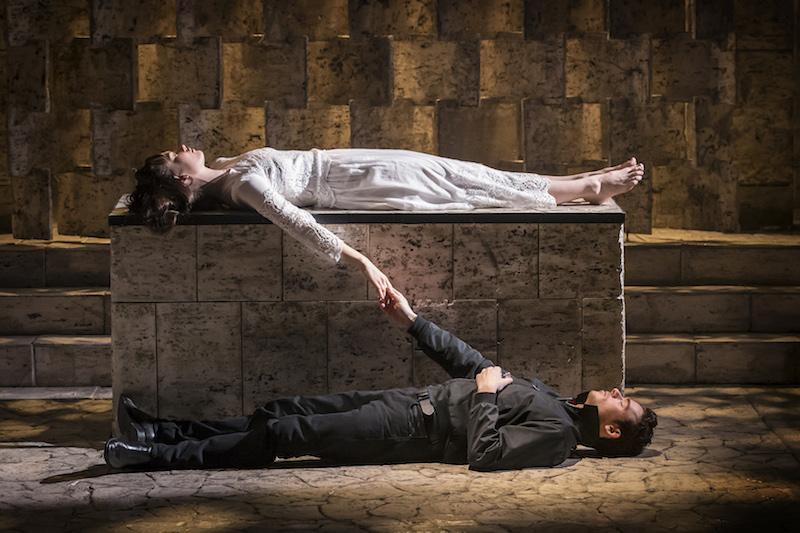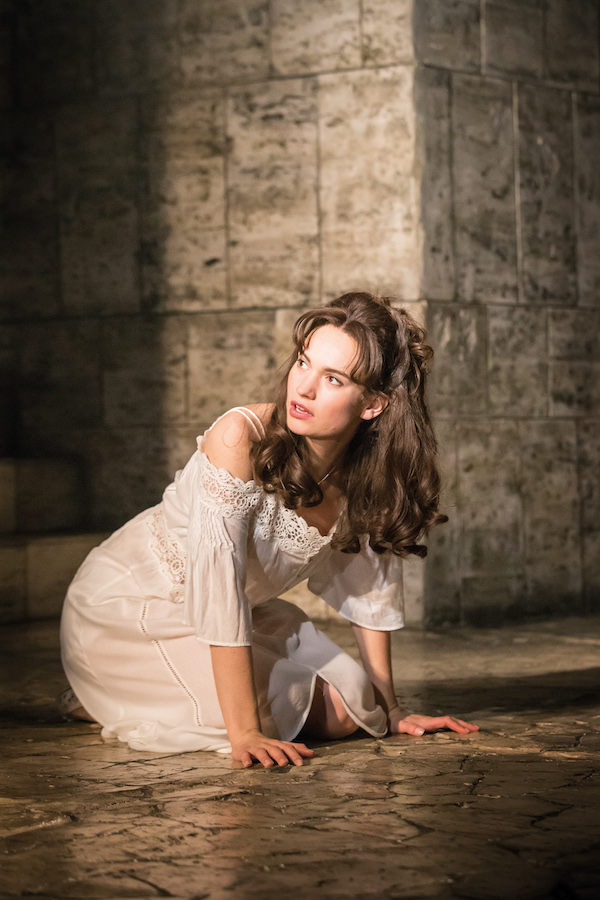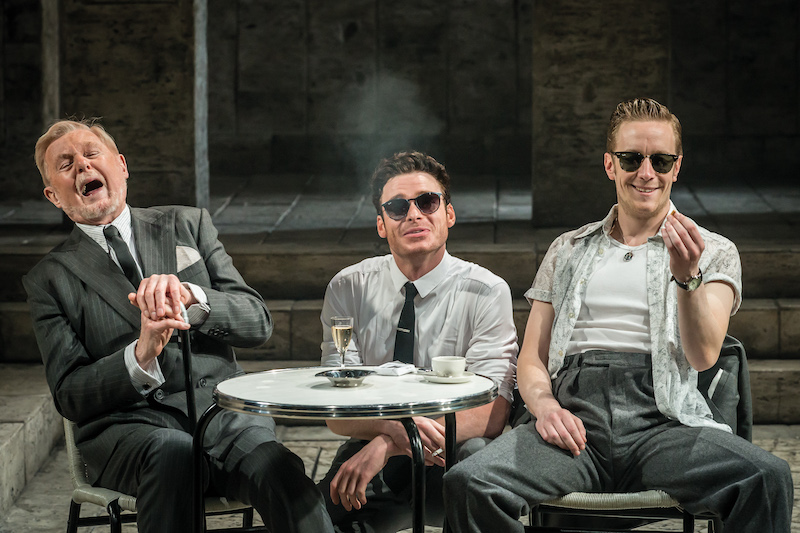Romeo and Juliet, Garrick Theatre | reviews, news & interviews
Romeo and Juliet, Garrick Theatre
Romeo and Juliet, Garrick Theatre
Branagh's la dolce vita is ravishing, but superficial

Trouble remembering in which country Shakespeare’s star-crossed lovers cross paths? Branagh’s panting paean to Fellini will sort you out. Stylish as a monochromatic Vogue spread, and as self-consciously Italian as Bruno Tonioli guzzling lasagne in a gondola, it’s not exactly a triumph of cultural nuance.
In this context, the high-speed courtship and resulting fallout seem almost run-of-the-mill. The lovers’ tale is given ethnological grounding and wrapped in the historic cycle of violence and grief, but it’s also forced to compete with a plethora of passions. Richard Madden’s Romeo, here a nice chap buffeted by circumstances, is overwhelmed in a production characterised by extremes. Bland earnestness makes him a perfectly likeable boyfriend, downright puzzling as the object of life-or-death devotion, and he alternately swallows and plods through the verse. Lily James (pictured below) works overtime to salvage their romance, though the pair – who also courted in Branagh’s Cinderella – have yet to find persuasive chemistry.
 With Madden leaving a void, James seizes hold of the play and makes it the tale of a girl forced to grow up far too quickly. She begins an impulsive child, turning cartwheels, shifting from foot to foot impatiently while being lectured, and absently rubbing the back of her leg with an unfamiliar high heel, totally unaware of her effect on others. She marvels at the miracle of love, drunk on both romance and illicit Champagne, berates herself for not playing it cool with Romeo by being “more strange”, and gets a fit of hiccups at the mere mention of marriage. But each tragedy strips away a layer of giddy girlishness, and each betrayal builds a steely resolve to control her own fate.
With Madden leaving a void, James seizes hold of the play and makes it the tale of a girl forced to grow up far too quickly. She begins an impulsive child, turning cartwheels, shifting from foot to foot impatiently while being lectured, and absently rubbing the back of her leg with an unfamiliar high heel, totally unaware of her effect on others. She marvels at the miracle of love, drunk on both romance and illicit Champagne, berates herself for not playing it cool with Romeo by being “more strange”, and gets a fit of hiccups at the mere mention of marriage. But each tragedy strips away a layer of giddy girlishness, and each betrayal builds a steely resolve to control her own fate.
As a dapper, mincing Mercutio, Derek Jacobi makes a five-course meal out of the Queen Mab speech and savours every arch putdown, even punctuating them with an audible “Boom boom”. He prances, he croons, and he offers a riposte to doubts about the casting of a 77-year-old by whipping a sword out of his walking stick. He has an effective sparring partner in Jack Colgrave Hirst’s restless Benvolio (pictured below with Jacobi and Madden), but his relationship to the much younger Romeo is ill-defined, therefore its violent severing lacks impact.
Meera Syal’s bawdy, Brummie Nurse operates in a similarly broad comic vein, though she does hint at the guardian’s fatal cowardice. While Marisa Berenson’s oddly American Lady Capulet seems anaesthetised, Michael Rouse produces a brutish, wild-eyed Capulet battling for control in a world made strange. If at times reminiscent of Branagh’s overwrought Leontes, he does stirringly communicate the fear that, in losing your offspring, you lose your immortal mark upon the earth. Samuel Valentine’s youthful Friar is a wry, compassionate arbiter ruinously burdened by terrible responsibility, Ansu Kabia’s intense Tybalt seethes and plots, Tom Hanson makes an amusingly cocksure Paris, and there’s light relief from Kathryn Wilder’s put-upon Peter.
 Christopher Oram’s marble pillars and gauzy drapes are attractive but fussy, and Patrick Doyle’s score too intrusive – the addition of mournful strings to a key moment in Juliet’s journey particularly egregious. It’s one of several patronising touches from Branagh and co-director Rob Ashford. Accessibility should be applauded, but we don’t need the lovers spotlit when (groan) their eyes meet across a crowded room, and several additions seem too eager to please – a jazzy cabaret number for Juliet, a surfeit of cheaply atmospheric candles, and a Whiplash-esque drum accompaniment to the movements of “prince of cats” Tybalt, who “keeps time, distance and proportion” during his duelling.
Christopher Oram’s marble pillars and gauzy drapes are attractive but fussy, and Patrick Doyle’s score too intrusive – the addition of mournful strings to a key moment in Juliet’s journey particularly egregious. It’s one of several patronising touches from Branagh and co-director Rob Ashford. Accessibility should be applauded, but we don’t need the lovers spotlit when (groan) their eyes meet across a crowded room, and several additions seem too eager to please – a jazzy cabaret number for Juliet, a surfeit of cheaply atmospheric candles, and a Whiplash-esque drum accompaniment to the movements of “prince of cats” Tybalt, who “keeps time, distance and proportion” during his duelling.
The Fifties setting has potential, with machismo injected into the patriarchal society and high style tempered by an uneasy awareness of recent bloodshed. However, it proves more of an excuse for fabulous fashion than an emotional evacuation of the play. Bellissima, and blessed with a winning star turn, but ultimately rather hollow.
rating
Explore topics
Share this article
The future of Arts Journalism
You can stop theartsdesk.com closing!
We urgently need financing to survive. Our fundraising drive has thus far raised £49,000 but we need to reach £100,000 or we will be forced to close. Please contribute here: https://gofund.me/c3f6033d
And if you can forward this information to anyone who might assist, we’d be grateful.

Subscribe to theartsdesk.com
Thank you for continuing to read our work on theartsdesk.com. For unlimited access to every article in its entirety, including our archive of more than 15,000 pieces, we're asking for £5 per month or £40 per year. We feel it's a very good deal, and hope you do too.
To take a subscription now simply click here.
And if you're looking for that extra gift for a friend or family member, why not treat them to a theartsdesk.com gift subscription?
more Theatre
 Troilus and Cressida, Globe Theatre review - a 'problem play' with added problems
Raucous and carnivalesque, but also ugly and incomprehensible
Troilus and Cressida, Globe Theatre review - a 'problem play' with added problems
Raucous and carnivalesque, but also ugly and incomprehensible
 Clarkston, Trafalgar Theatre review - two lads on a road to nowhere
Netflix star, Joe Locke, is the selling point of a production that needs one
Clarkston, Trafalgar Theatre review - two lads on a road to nowhere
Netflix star, Joe Locke, is the selling point of a production that needs one
 Ghost Stories, Peacock Theatre review - spirited staging but short on scares
Impressive spectacle saves an ageing show in an unsuitable venue
Ghost Stories, Peacock Theatre review - spirited staging but short on scares
Impressive spectacle saves an ageing show in an unsuitable venue
 Hamlet, National Theatre review - turning tragedy to comedy is no joke
Hiran Abeyeskera’s childlike prince falls flat in a mixed production
Hamlet, National Theatre review - turning tragedy to comedy is no joke
Hiran Abeyeskera’s childlike prince falls flat in a mixed production
 Rohtko, Barbican review - postmodern meditation on fake and authentic art is less than the sum of its parts
Łukasz Twarkowski's production dazzles without illuminating
Rohtko, Barbican review - postmodern meditation on fake and authentic art is less than the sum of its parts
Łukasz Twarkowski's production dazzles without illuminating
 Lee, Park Theatre review - Lee Krasner looks back on her life as an artist
Informative and interesting, the play's format limits its potential
Lee, Park Theatre review - Lee Krasner looks back on her life as an artist
Informative and interesting, the play's format limits its potential
 Measure for Measure, RSC, Stratford review - 'problem play' has no problem with relevance
Shakespeare, in this adaptation, is at his most perceptive
Measure for Measure, RSC, Stratford review - 'problem play' has no problem with relevance
Shakespeare, in this adaptation, is at his most perceptive
 The Importance of Being Earnest, Noël Coward Theatre review - dazzling and delightful queer fest
West End transfer of National Theatre hit stars Stephen Fry and Olly Alexander
The Importance of Being Earnest, Noël Coward Theatre review - dazzling and delightful queer fest
West End transfer of National Theatre hit stars Stephen Fry and Olly Alexander
 Get Down Tonight, Charing Cross Theatre review - glitz and hits from the 70s
If you love the songs of KC and the Sunshine Band, Please Do Go!
Get Down Tonight, Charing Cross Theatre review - glitz and hits from the 70s
If you love the songs of KC and the Sunshine Band, Please Do Go!
 Punch, Apollo Theatre review - powerful play about the strength of redemption
James Graham's play transfixes the audience at every stage
Punch, Apollo Theatre review - powerful play about the strength of redemption
James Graham's play transfixes the audience at every stage
 The Billionaire Inside Your Head, Hampstead Theatre review - a map of a man with OCD
Will Lord's promising debut burdens a fine cast with too much dialogue
The Billionaire Inside Your Head, Hampstead Theatre review - a map of a man with OCD
Will Lord's promising debut burdens a fine cast with too much dialogue

Add comment